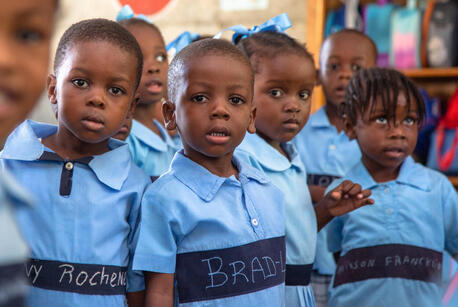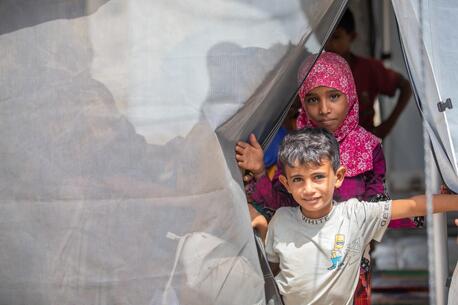
UNICEF: Children in Haiti Need More Help Now
UNICEF warned world leaders of a rapidly deteriorating situation in Haiti, appealing for more international support to meet urgent needs.
Haiti crisis growing worse by the day
The humanitarian crisis in Haiti warrants greater attention and action by the global community, UNICEF Executive Director Catherine Russell said at a UN Security Council briefing on Monday.
Armed groups have proliferated in the country amid political and economic turmoil, expanding their operations beyond Port-au-Prince and "perpetuating extreme levels of violence" in and around the capital city and neighboring Artibonite department, Russell said.
Children are getting killed and injured in the crossfire — some on their way to school.
In some communities, life is more dangerous now than it has ever been.
Children are also being forcibly recruited to fight with the gangs. Others are joining them out of sheer desperation, Russell said.
There are about 2 million people in Haiti — including 1.6 million women and children — living in areas controlled by the groups.
"The crisis in Haiti grows worse by the day," Russell said.

Half the population needs humanitarian assistance, including nearly 3 million children. "But half of those in need of assistance aren't getting it, because of insecurity and insufficient humanitarian funding," Russell said. "Basic services are on the verge of collapse. And in some communities, life is more dangerous now than it has ever been."
Communities terrorized, women and girls targeted by sexual violence
Russell visited Haiti in June. "I saw firsthand how horrific violence and fear are tearing apart the very fabric that binds families and communities together," she told the Council. "Communities are being terrorized ... and women and girls are being targeted by extreme levels of gender-based and sexual violence."
Rapes and other horrific crimes and abuses, Russell said, "are now commonplace."
Another big problem is that Haiti is losing its skilled workforce. Those who are fleeing their communities and trying to leave the country are the same people needed to deliver essential services.
Abductions for ransom "have skyrocketed" while students, teachers and health workers are threatened daily. Armed groups have blocked major transport routes in and out of the capital city, destroying livelihoods and further hindering access to critical services — all of which has contributed to an intensifying food security and nutrition crisis.
Nearly 1 in 4 children in Haiti is chronically malnourished
An estimated 115,000 children in Haiti are suffering from severe wasting — a 30 percent increase since last year — and nearly a quarter of all children in Haiti are chronically malnourished, at great risk to their physical and cognitive development.
At the same time — despite being declared cholera-free on Feb. 4, 2022, after three years without a confirmed case — the country has been battling a resurgence of the waterborne disease.

Cholera is a bacterial infection spread through contaminated food and water. It often leads to acute watery diarrhea, which can lead to severe dehydration. As of late September, more than 64,400 suspected cholera cases had been reported, nearly half of them children.
“Severely malnourished children are five times more likely to die from cholera without urgent treatment," Russell said, noting that Haiti's national health system, woefully under-resourced and under capacity, cannot meet current needs.
UNICEF is committed to stay and deliver for children in Haiti despite dangerous conditions — but more support is needed
UNICEF is the ground in Haiti, working with partners to deliver lifesaving aid to children and women in need despite dangerous conditions, Russell said, and will continue to do so — “but we need more support.”

Specific ongoing UNICEF-supported interventions in Haiti include:
- helping families access safe water
- supporting primary health care needs through mobile clinics
- recruiting and deploying health care workers to strengthen services for children and pregnant women, including routine child vaccinations
- distributing cholera kits and supporting cholera vaccination and other community prevention campaigns
- identifying malnourished children and treating those suffering from severe wasting
- providing psychosocial support services to children in need
- distributing school kits and supporting efforts to reopen schools
- helping children separated from caregivers secure alternative care or reunite with their families
UNICEF's appeal for support for Haiti includes funding required to respond effectively to the imminent humanitarian needs, while building conditions for more shock-responsive systems. It remains significantly (81 percent) underfunded.
Read the latest Situation Report for more details about UNICEF's humanitarian response in Haiti.
In her address to the Council, Russell called on international financial institutions and development partners to help keep Haitian social sectors and services operating – "at least until their capacity is rebuilt.” Russell also acknowledged that progress in Haiti is contingent upon significant improvements to the security situation.
UNICEF relies on voluntary contributions to fund its global programs and emergency response operations. You can help. Donate today.
HOW TO HELP
There are many ways to make a difference
War, famine, poverty, natural disasters — threats to the world's children keep coming. But UNICEF won't stop working to keep children healthy and safe.
UNICEF works in over 190 countries and territories — more places than any other children's organization. UNICEF has the world's largest humanitarian warehouse and, when disaster strikes, can get supplies almost anywhere within 72 hours. Constantly innovating, always advocating for a better world for children, UNICEF works to ensure that every child can grow up healthy, educated, protected and respected.
Would you like to help give all children the opportunity to reach their full potential? There are many ways to get involved.





